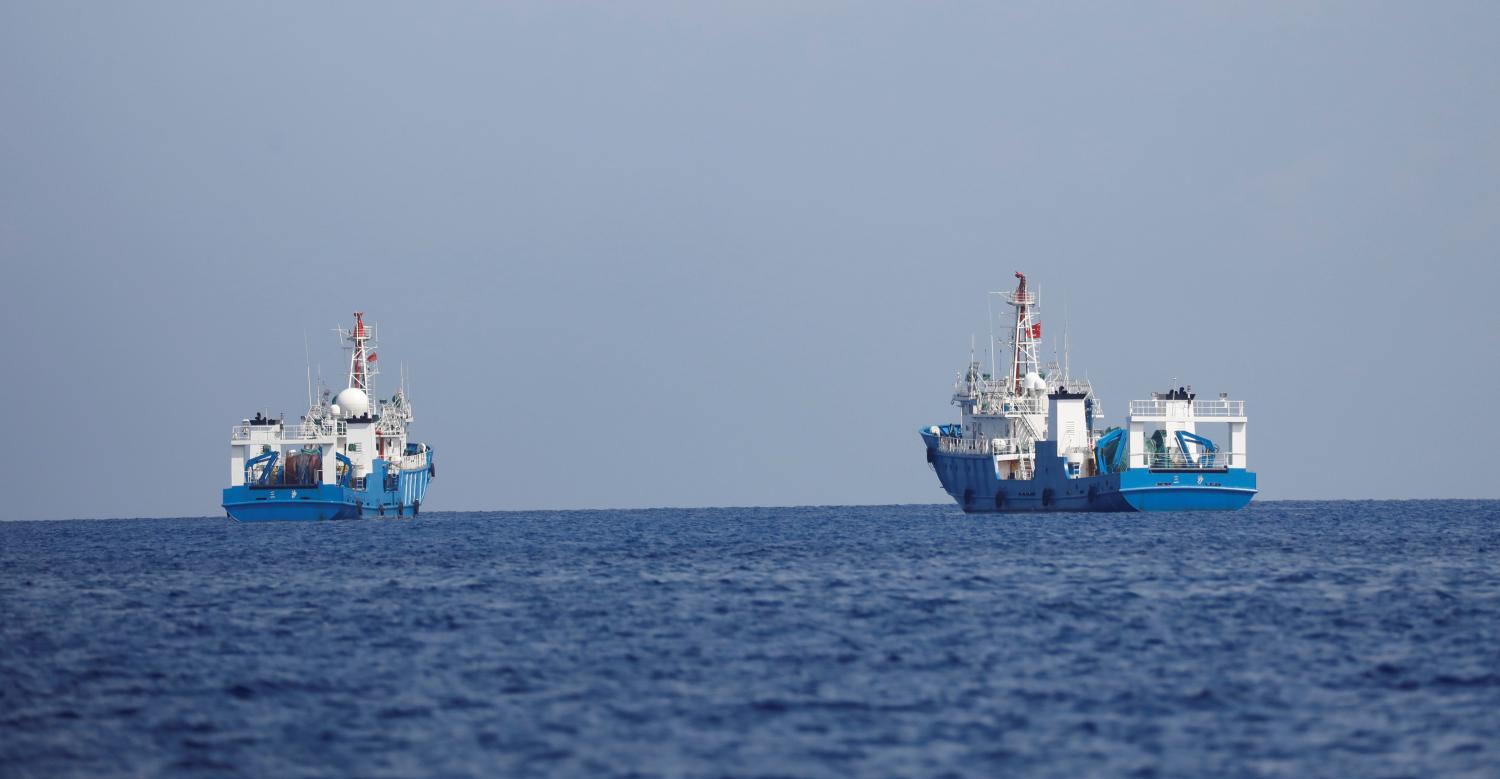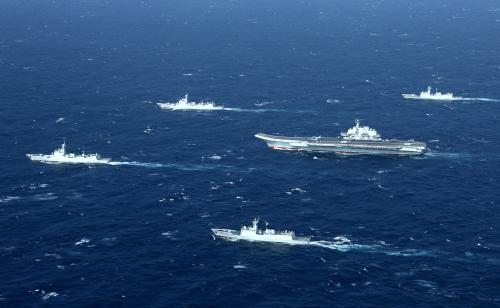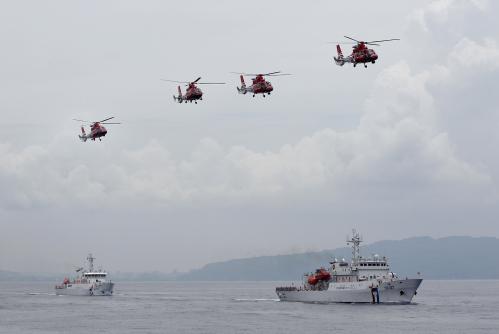China’s interpretation of the law of the sea within what it claims to be its own waters has long clashed with that of maritime powers and the majority of members of the international community. The United States regularly asserts maritime rights and freedoms under its “freedom of navigation” program, much to Beijing’s chagrin.
But as other maritime powers join the United States in taking steps to defend maritime rights—a British Royal Navy warship makes its way through the South China Sea this month—it is in China’s interests to learn from the Soviet example. As the Soviet navy transitioned from a “reactive coastal fleet” to a “proactive, expansionist, blue-water navy,” the Soviet attitude towards the law of the sea changed. It moved from one that sought to limit maritime freedoms to one that joined hands with naval powers, including its Cold War foe, the United States, to push for protection of such freedoms. A similar shift would help boost China’s international reputation, as well as protect and advance its interests across the globe.
Maritime powers join hands
British Defense Secretary Gavin Williamson confirmed last month that a Royal Navy warship would sail through the South China Sea in March on its way back from Australia to the United Kingdom to assert navigation rights in waters Beijing claims. The HMS Sutherland left Sydney for the South China Sea on March 15, undertaking training with the Australian navy in the meantime. It is not clear what rights, exactly, the United Kingdom will assert—Williamson declined to say whether it would exercise rights to innocent passage within 12-nautical miles of disputed land territories or wider freedoms outside of territorial seas.
What is clear, however, is that in taking steps to assert rights vested under the United Nations Convention on the Law of the Sea (UNCLOS) in the South China Sea, the United Kingdom joins other maritime powers in guarding against their erosion. In June 2016, the French minister of defense underscored his country’s commitment to the principles of freedom of navigation and overflight and the navy’s intention to continue to pass through the waters of the region several times a year. In the first half of 2016, French navy vessels deployed to the region three times.
U.S. Freedom of Navigation program
The United States, for its part, regularly asserts maritime rights vested under UNCLOS under its “freedom of navigation” program. The program’s name is a bit of a misnomer since it protects more than the right to navigate from point A to point B. It defends a whole basket of rights and freedoms, including the right of warships to exercise innocent passage within territorial seas without prior notification or authorization, and the freedom to conduct military activities, including surveillance and reconnaissance, outside of territorial seas. The U.S. freedom of navigation program also pushes back against excessive maritime claims that limit rights and freedoms of warships and warplanes. In the past year, U.S. forces under the freedom of navigation program challenged China’s claims to a territorial sea from offshore features not entitled to one under UNCLOS.
Given its wide scope, it is more accurate to describe the program as a “freedoms of the seas” or “excessive maritime claims” program. More accurate terminology would make it more difficult for China to sidestep real disagreements over legitimate rights and freedoms under UNCLOS. Beijing suggests that the United States and others invent concerns over “freedom of navigation,” but its argument only has superficial validity if we take “freedom of navigation” in its narrowest sense. Still, the term “freedom of navigation” operations, or “FONOPS,” has stuck. From October 1, 2016, to September 30, 2017, the United States conducted freedom of navigation operations to challenge the excessive maritime claims of 22 countries around the world.
Beijing’s response
China has objected strongly to U.S. assertions of maritime rights, variously maintaining that they are “provocative,” a “use of force,” “boost regional militarization,” and constitute “misconduct.”
In the most recent U.S. operation, which took place on March 23, the USS Mustin came within 12 nautical miles of Mischief Reef, an artificial island in the Spratlys that is home to a major Chinese airfield, and conducted maneuvers. A spokesperson from China’s Ministry of Foreign Affairs protested that it was done without the permission of the Chinese government and was “a serious political and military provocation.” She maintained that China has “indisputable sovereignty” over the Spratly Islands and “its adjacent waters.” However, the United Nations tribunal in the Philippines case against China had clearly ruled that Mischief Reef is a low-tide elevation that does not generate a territorial sea and is not capable of an independent sovereignty claim. The United States was perfectly within its rights to exercise high sea freedoms.
In an earlier operation this year, the USS Hopper sailed within 12 nautical miles of Scarborough Shoal on January 17 without China’s permission. China complained that the U.S. vessel “violated China’s sovereignty and security interests” and warned that Beijing would take “necessary measures” to protect its sovereignty. But sovereignty over Scarborough Shoal, a land feature off the Philippines island of Luzon, is disputed (China, Taiwan and the Philippines claim the feature), and in any event does not affect the right of the ships of all states to exercise innocent passage within its territorial sea without prior notification or authorization.
China also voiced objections when in July last year the United Kingdom first indicated its intention to send two new aircraft carriers on freedom of navigation operations to the region. It warned “countries outside the region” against “stirring up trouble.” When recently asked about the HMS Sutherland mission, Beijing cautioned that “there shall not be any attempt to set winds blowing and waves rolling.”
Such objections, however, are unwarranted: Freedom of navigation operations are no more than legitimate, peaceful assertions of a legal position, so that rights are not lost in law or in practice over time. With more countries taking steps to support maritime rights vested under UNCLOS and to uphold the rule of law, and more possibly to follow—Australia is under renewed pressure to undertake freedom of navigation operations—how should China respond so that its national interest are taken into account?

The Soviet experience
China can take a page out of the Soviet experience. William E. Butler, in a book published in the early 1970s, traces how the Soviet Union’s approach to the law of the sea evolved as it transitioned from a state “possessing an insignificant navy and merchant marine and whose marine interest lay primarily in coastal waters” into a state “possessing a formidable naval capability, a major high seas fishing fleet and merchant marine, and worldwide maritime interests.” With this transition, the Soviet Union’s approach to the law of the sea moved from one that reflected fears of encirclement during the first United Nations conference on the law of the sea (1956–1958), to an approach that joined hands with naval powers, including its ideological enemy, the United States, to push for protection of maritime freedoms.
What this meant in concrete terms, as authors George Galdorisi and Kevin Vienna highlight, was the Soviet Union moving from advocating for the widest limit for the breadth of the territorial sea that could command widespread support, to advocating for the narrowest limit for the breadth of the territorial sea that could command widespread support. It also meant the Soviet Union agreeing to accept a 200-mile economic zone, provided high seas freedoms in the zone for non-resource use were preserved.
While Soviet legislation passed soon after conclusion of the third and final United Nations conference on the law of the sea in 1982 was ambiguous, the ambiguity was cleared up by late 1989. That year, an American cruiser tried to exercise the right of innocent passage through Soviet territorial waters in the Black Sea and a Soviet frigate bumped it with the intention of pushing it into international waters. The incident sparked negotiations, leading the Soviet Union and the United States to sign the Uniform Interpretation of Rules of International Law Governing Innocent Passage, harmonizing the two countries’ position on innocent passage. They agreed that “[a]ll ships, including warships, regardless of cargo, armament or means of propulsion, enjoy the right of innocent passage through the territorial sea in accordance with international law, for which neither prior notification nor authorization is required.” In signing this agreement and bringing its domestic legislation clearly in line with it, the Soviet Union’s position on this issue was now consistent with that of the majority of states.
In short, the Soviet experience with the law of the sea highlights how advancing maritime capabilities and expanding global interests led the Soviet Union to adopt a position that protects maritime freedoms, even if it meant working with its Cold War adversary.
Maritime freedoms advance China’s global interests
The dramatic build-up of China’s blue-water navy in recent years and its interests which increasingly span the globe arguably mirror the Soviet Union’s trajectory in the 1960s and 1970s. China has the world’s second most powerful navy, is by far the largest fishing nation (based on capture production), possesses the largest distant water fishing fleet, and has the third-largest (in deadweight tons) merchant fleet in the world.
Indeed, China’s naval power has increased so rapidly that The Economist observes that “[r]arely in times of peace has a country acquired naval power at such a rate.” The country is likely to continue on this path: its 2015 White Paper on Military Strategy emphasizes the importance of out-of-area operations for China’s national interests. In July 2017, China’s ships set sail for Djibouti to open the country’s first military base abroad since the Korean war. As the Belt and Road Initiative takes flesh, its security and economic interests abroad are only going to intensify.
As China moves from homeland defense to defense of interests abroad and power projection, the Soviet approach to the law of the sea provides valuable lessons for China. In the near term, China remains sensitive about warships in its territorial sea and what it perceives as close surveillance by the United States in areas outside its territorial waters. While varying figures have been cited for the number of states seeking to regulate foreign military activities in their exclusive economic zone, only two countries have explicitly objected to surveillance and reconnaissance in this zone, namely, Iran and China.
In the longer term, China would do well to realize that the modernization of its navy and dependence on international trade give it the same interests in freedoms of the seas as other naval powers. Indeed, it was exercising these very freedoms in 2014 during the U.S.-led Rim of the Pacific joint naval drills in Hawaii when an uninvited Chinese surveillance ship conducted surveillance operations in Hawaii’s exclusive economic zone. It was also asserting these rights in 2015 when a Chinese flotilla reportedly travelled east from somewhere near Russia and entered the Bering Sea, navigating north of the Aleutian Islands before transiting south, undertaking innocent passage through U.S. waters between two islands without prior notification or authorization. The United States rightly acknowledged that both acts were in accordance with international law. China should take a page out of the U.S. book and recognize that U.S. freedom of navigation operations in the South China Sea are similarly lawful and within its rights.
Thus far, Beijing continues to insist on a different standard in the South China Sea. Analysts like Steven Stashwick observe how China takes advantage of more liberal interpretations of international law outside its waters while circumscribing that law within what it claims to be its own waters.
China’s current approach heightens the risk of incidents at sea and of major confrontation as other powers dispute China’s interpretation of rights vested under UNCLOS. Bringing its interpretation in line with the vast majority of members of the international community will help boost China’s reputation and increase trust in the superpower. Critically, it will also help China protect and advance its interests across the globe. The Soviet Union understood that freedoms of the seas are particularly advantageous to naval powers and proceeded accordingly. Whether China will come to this realization before needless confrontation remains an open question.










Commentary
China can learn from Soviet approach to the law of the sea
March 27, 2018